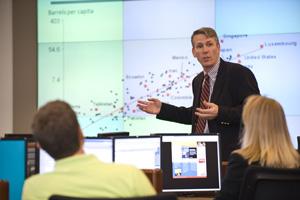Energy summit aims to spur mutidisciplinary research
Since 2008, the Freeman School and the School of Science & Engineering have been collaborating on research into the production and utilization of next generation fuels for clean power, including butanol from sugar cane waste products, but according to Geoff Parker, more research is needed.

“A lot of times when we apply for grants or funding, we have some pieces of the puzzle, but we might have to scramble to identify all capabilities we need,” says Parker, associate professor of economic sciences and director of the Tulane Energy Institute. “Many of the challenges are really multidisciplinary now and require coordination across units.”
Promoting coordination across units is the goal of this Friday’s Tulane Energy Day. Sponsored by the Provost’s Office and organized by Parker and Doug Meffert, deputy director of the Center for Bioenvironmental Research, the one-day summit represents the first attempt to bring together researchers interested in energy from across the university. Faculty members from chemical and biomedical engineering, economics, business, environmental studies, public health, law and other disciplines will make brief presentations about their current research.
“This is one way to prepare to take advantage of some of the multidisciplinary opportunities that have been coming up as part of the stimulus funding,” Parker says. “It’s really about knowing what Tulane’s capabilities are.”
Much of Tulane’s recent energy research has been coordinated through the Clean Power and Energy Research Consortium, a collaboration between Tulane and five other universities in Louisiana established to addresses critical scientific, engineering and economic issues associated with power and energy generation. Given the complexity of the subject, Parker says a multidisciplinary approach makes sense.
“There are economic issues, there are scientific issues, there are cultural issues,” Parker says. “In order to make progress, you really need a multidisciplinary approach to understand the problems and then help fashion improvements.”
For more information about Tulane Energy Day and to see the complete schedule, visit http://www.freeman.tulane.edu/energy/energyday.php.
Interested in advancing your education and/or career? Learn more about Freeman’s wide range of graduate and undergraduate programs. Find the right program for you.
Other Related Articles
- Harvard Business Review: Why AI Boosts Creativity for Some Employees but Not Others
- Forbes: How To Talk Politics With Family Over The Holiday
- AI-powered fund takes top prize in Aaron Selber Jr. Hedge Fund Course
- De Franco appointed Keehn Berry Chair of Banking and Finance
- The Wall Street Journal: For Trump, the Warner Megadeal Talks Are All About CNN
- Research Notes: Matthew Higgins
- New Goldring Institute director hopes to expand international partnerships
- New study shows how personal profiles transform social media customer service
